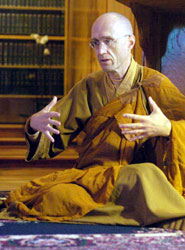Faces of Berkeley ‘
Macintosh Monk’ Spreads Digital Dharma
By JULIE STRACK -
Contributing Writer / Wednesday, November 2, 2005

PHOTO/SALGU WISSMATH
Reverend Heng Sure, a Buddhist monk living in a Berkeley monastery,
hopes to reach Western audiences by podcasting his lectures on
Eastern philosophy and veganism.
When Reverend Heng Sure, Ph.D. isn't meditating at the Berkeley
Buddhist Monastery or teaching at the Graduate Theological
Union, he's recording lectures for his podcast and composing
on his 12-string acoustic guitar.
The
56-year-old Ohio native, who has lived in Berkeley for 33 years
and has been a celibate Buddhist monk for 29 years, spreads
his personal blend of traditional Eastern enlightenment philosophy
and his vegan lifestyle through intimate lectures and global
podcasts.
Sure gives weekly lectures at the Downtown Berkeley monastery,
where he also lives, translating the the Sutra, Buddhism's written
teachings, line by line. He was recently awarded his doctorate
degree by the Graduate Theological Union, where he also teaches
classes.
To
keep up with fellow technologically savvy monks, Sure began
podcasting his lectures four months ago on the Buddhist Text
Translation Society's Web site. He also spoke at an annual (www.vegsource.com)
conference several weeks ago, where he performed his original
song, "If I Were an American Beef Cow, I'd
Be Mad Too" on his guitar.
Sure, who received his master's degree from UC Berkeley's former
Graduate School of Oriental Languages in the 1970s, said he hopes
his distribution efforts help make Buddhism accessible to Western
audiences. He aims to teach students how to have fulfilling relationships
and dialogue with family and community.
"I'm a Macintosh monk," Sure says. "Podcasting
my lectures makes them available to people who might not otherwise
have access to the Dharma. Last week, I was fielding questions
from people in Australia, real-time."
Although he praises the convenience of technology, Sure worries
the lack of human interaction in podcasting could dilute part
of his message.
"Communication is very fragile," he says. "When
some of the senses, such as sight, touch and smell are lost,
it is harder to achieve wisdom."
Nevertheless, Sure believes podcasting has its advantages. He
plans to start prerecording Chinese-language lectures, which
he hopes will increase the size of his audience in China.
In Berkeley alone, Sure has a regular listener base of about
70 families who frequent his lectures as well as a youth group
and weekly roundtable discussions he also directs.
Sure says that over the years, Berkeley has built a vibrant
and diverse Buddhist community comprised of Chinese, Taiwanese,
Vietnamese, white, black and Hispanic worshippers.
Sure himself decided to become a monk after becoming disillusioned
with the peace movement of the 1960s. While studying Chinese
text in UC Berkeley's graduate program, Sure met his mentor,
the Venerable Master Hsuan Hua, at a Bay Area Buddhist monastery
and realized he had found his calling.
"When I walked in to the room, I felt as if I had been
there before," he says.
Sure
spent nearly three years making
a pilgrimage across 100 miles
of
California, travelling on foot and bowing deeply every
third step. He also took a six-year vow of silence which taught
him to "tell the truth and drop the illusion in his conversation."
Since then, he has practiced his religion in Calgary, Tibet
and Taiwan, but says his heart has always been in Berkeley.
"I have an affinity to Berkeley," he says. "I
feel at home here. It surpasses understanding."
|